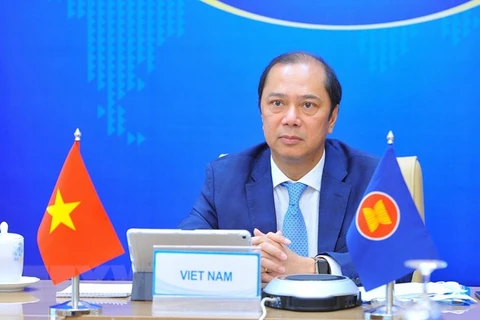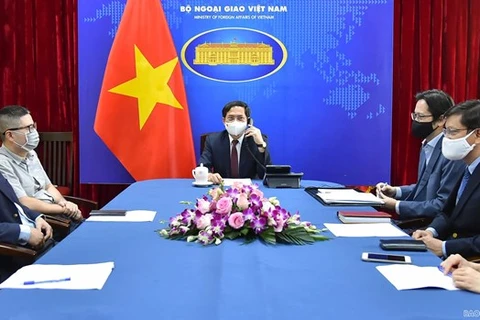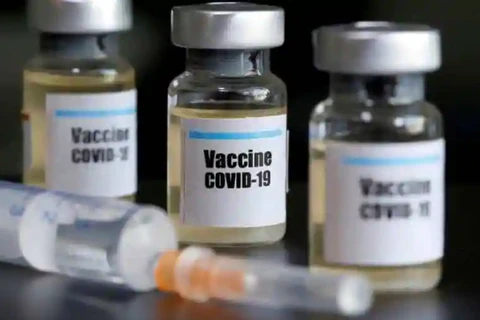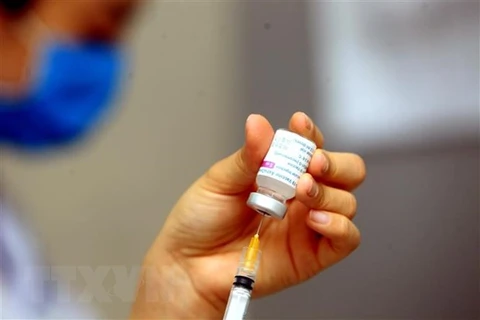Hanoi (VNA) - ASEAN member countries are working towards accessing COVID-19 vaccine sources for large-scale immunisation campaigns in a bid to reach herd immunity in 2022, heard a workshop held online in Hanoi on May 25.
Vietnamese and foreign experts told the workshop that COVID-19 responding solutions and economic stimulus packages have also been sought with the hope to end negative measures of lockdown and social distancing and speeding up economic recovery.
The experts analysed the different moves adopted by ASEAN countries in dealing with COVID-19 as well as ASEAN cooperation in the endeavour, to offer policy recommendations to regional countries on how to fight the pandemic.
Caitlin Wiesen, UNDP Resident Representative in Vietnam, said Indonesia, Malaysia and the Philippines have been hardest hit in ASEAN by recent outbreaks in April and May, with thousands of new infections reported each day, while Thailand has confirmed over 100,000 cases and Laos, Cambodia, and Vietnam are experiencing their toughest outbreaks so far.
In this context, countries are tightening border management, she said, noting that new vaccines have been researched and produced around the world at an unprecedented pace and the COVAX facility, funded by the World Health Organisation (WHO), has also showed potential in building a multilateral and equal approach to vaccine distribution. Between 1 and 33 percent of people in ASEAN member countries have received at least one COVID-19 vaccine shot, she said.
The official noted that Vietnam has planned to form a 1-billion-USD COVID-19 vaccine fund while the National Assembly has set aside 500 million USD to speed up vaccine purchases from different sources. These are important strategies in COVID-19 prevention and control, she said, adding that Vietnam is also working to produce its own vaccines.
The UNDP highly valued Vietnam’s initiative in registering with WHO to become a potential vaccine production hub to meet domestic and regional demand, she said.
Wiesen stressed that Vietnam is the only country in ASEAN and one of a few in the world to post positive economic growth in 2020. Research by the UNDP shows that Vietnamese people strongly support the Government in its COVID-19 prevention and control efforts, while medical staff and the community as a whole are working tirelessly on the task.
Meanwhile, Associate Prof. Dr. Nguyen Huy Hoang from the Institute for Southeast Asian Studies (ISEAS) told the workshop that Southeast Asia was one of the first regions affected by COVID-19.
As of May 24, it had recorded more than 3.8 million COVID-19 infections and nearly 76,000 fatalities. ASEAN economies have been seriously damaged, he noted, adding that the rapid spread of the pandemic resulted in disruptions in supply chains while frozen demand has led to a slump in tourism, trade, and investment activities. The majority of economic activities have been interrupted and stagnated due to lockdown and social distancing measures.
COVID-19 has also created social instability and a public health crisis, increasing poverty and unemployment rates as well as affecting people’s welfare in the mid-term, Hoang said, stressing that when the number of COVID-19 infections rise, countries will also face a shortage of medical equipment and staff.
He believed emergency and public health agencies throughout ASEAN have promptly and regularly taken action, shared information and their best response measures at ASEAN meetings on the pandemic.
ASEAN leaders have proposed the re-allocation of resources for pandemic prevention and control, set up a fund for COVID-19 response, and standardised operational procedures in the field, he noted.
Vietnamese and foreign experts told the workshop that COVID-19 responding solutions and economic stimulus packages have also been sought with the hope to end negative measures of lockdown and social distancing and speeding up economic recovery.
The experts analysed the different moves adopted by ASEAN countries in dealing with COVID-19 as well as ASEAN cooperation in the endeavour, to offer policy recommendations to regional countries on how to fight the pandemic.
Caitlin Wiesen, UNDP Resident Representative in Vietnam, said Indonesia, Malaysia and the Philippines have been hardest hit in ASEAN by recent outbreaks in April and May, with thousands of new infections reported each day, while Thailand has confirmed over 100,000 cases and Laos, Cambodia, and Vietnam are experiencing their toughest outbreaks so far.
In this context, countries are tightening border management, she said, noting that new vaccines have been researched and produced around the world at an unprecedented pace and the COVAX facility, funded by the World Health Organisation (WHO), has also showed potential in building a multilateral and equal approach to vaccine distribution. Between 1 and 33 percent of people in ASEAN member countries have received at least one COVID-19 vaccine shot, she said.
The official noted that Vietnam has planned to form a 1-billion-USD COVID-19 vaccine fund while the National Assembly has set aside 500 million USD to speed up vaccine purchases from different sources. These are important strategies in COVID-19 prevention and control, she said, adding that Vietnam is also working to produce its own vaccines.
The UNDP highly valued Vietnam’s initiative in registering with WHO to become a potential vaccine production hub to meet domestic and regional demand, she said.
Wiesen stressed that Vietnam is the only country in ASEAN and one of a few in the world to post positive economic growth in 2020. Research by the UNDP shows that Vietnamese people strongly support the Government in its COVID-19 prevention and control efforts, while medical staff and the community as a whole are working tirelessly on the task.
Meanwhile, Associate Prof. Dr. Nguyen Huy Hoang from the Institute for Southeast Asian Studies (ISEAS) told the workshop that Southeast Asia was one of the first regions affected by COVID-19.
As of May 24, it had recorded more than 3.8 million COVID-19 infections and nearly 76,000 fatalities. ASEAN economies have been seriously damaged, he noted, adding that the rapid spread of the pandemic resulted in disruptions in supply chains while frozen demand has led to a slump in tourism, trade, and investment activities. The majority of economic activities have been interrupted and stagnated due to lockdown and social distancing measures.
COVID-19 has also created social instability and a public health crisis, increasing poverty and unemployment rates as well as affecting people’s welfare in the mid-term, Hoang said, stressing that when the number of COVID-19 infections rise, countries will also face a shortage of medical equipment and staff.
He believed emergency and public health agencies throughout ASEAN have promptly and regularly taken action, shared information and their best response measures at ASEAN meetings on the pandemic.
ASEAN leaders have proposed the re-allocation of resources for pandemic prevention and control, set up a fund for COVID-19 response, and standardised operational procedures in the field, he noted.
Hoang asserted that to thoroughly control the pandemic, herd immunity is crucial, while more positive economic solutions are hoped to help regional countries recover faster./.
VNA
























